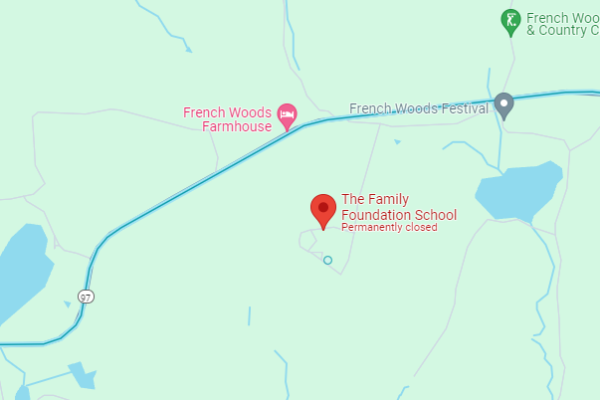
In a federal indictment unsealed in Syracuse on Thursday, April 4, 2024, harrowing details of the mistreatment suffered by teenagers at a now-closed boarding school in Upstate New York have come to light, according to Syracuse.com. Alarming allegations of physical, sexual, and emotional abuse have been leveled against a former staff member named Paul Geer, according to federal prosecutors. The school, known as Allynwood Academy and previously operating as the Family Foundation School, was located at 430, 431 Chapel Hill Rd, Hancock, NY 13783, in Delaware County, approximately an hour east of Binghamton.
Paul Geer, aged 56, was arraigned in federal court in Syracuse on Thursday, facing six charges that include coercion and enticement. However, he has pleaded not guilty to these charges.
The revelations of abuse have surfaced in the wake of multiple lawsuits filed by around a dozen former students against the school in both state and federal courts. These legal actions have been made possible by the state Child Victims Act, which allows individuals who suffered sexual abuse as children to pursue civil lawsuits, irrespective of when the abuse took place.
According to The New York Times, Geer was deposed twice during civil lawsuits that were eventually settled. During these depositions, he denied allegations of abuse but admitted to engaging in inappropriate conversations with students regarding sexual matters.
The school, which was owned and operated by the Argiros family for approximately three decades, catered to troubled teens and marketed itself as a facility capable of assisting children grappling with drug, alcohol, or behavioral problems. In 2014, due to declining enrollment, the school closed its doors, and the property was subsequently sold to the neighboring French Woods Sports and Arts Center, a renowned summer sleepaway camp for children.
Geer had been employed at the school for approximately 20 years, holding various positions such as music teacher and choral director, as revealed by prosecutors. Described as a "family leader," Geer possessed significant influence over students and held the power to impose punishments, which included physical abuse and deprivation.
Prosecutors have unveiled a distressing list of punishments inflicted upon the students, ranging from food deprivation to isolation in locked rooms for extended periods, being wrapped in blankets and sealed with duct tape, and carrying heavy loads of rocks. Furthermore, students endured prolonged periods of "blackout," during which verbal communication was strictly prohibited for weeks or even months.
In addition to these horrifying forms of punishment, Geer stands accused of repeatedly subjecting students to sexual abuse, including forced oral and anal sex. Prosecutors have highlighted specific instances in which Geer coerced teenagers to travel with him, crossing state and international borders. These include a trip to Maine in the summer of 1994 with a 15-year-old boy, a journey to nearby Pennsylvania in August 2000 with a 17-year-old girl, and a subsequent trip to Toronto eight months later with a 16-year-old boy.
The school's dark history came to public attention in 2018 when The New York Times ran a feature story, which highlighted the disproportionately high death rate among its alumni.
Former students have bravely come forward to share their traumatic experiences at the school. Jon Martin-Crawford, who attended Allynwood Academy for two years, testified before a U.S. House committee hearing on teen treatment programs in 2008. He recounted witnessing school staff members physically assaulting students, including punching them in the face and enclosing them within blankets by tightly wrapping and sealing them.
"While the existing programs have little long-term positive impact, I strongly believe that children in situations like mine need some form of assistance. I genuinely believe that there can be a safe solution, as some staff members are genuinely caring and decent individuals," Martin-Crawford proclaimed during his testimony. "We urgently require oversight and regulation of these facilities, with swift and severe penalties for those who deviate from the established standards."
Tragically, seven years after his testimony, Jon Martin-Crawford took his own life.
This distressing indictment has raised serious concerns about the treatment of teenagers in such facilities and has reignited calls for stricter oversight and regulation of institutions catering to troubled youth. The indictment against Paul Geer marks a crucial step toward justice for the victims, and the ongoing legal proceedings will undoubtedly play a pivotal role in holding accountable those responsible for the horrors inflicted upon vulnerable students.

In light of the newly released information about the abuse that occurred at the now-closed Allynwood Academy in Upstate New York, many are left wondering about the legal options available to boarding school abuse victims. To provide some much-needed clarity on this issue, we sat down with Laurence Banville, Esq., a New York boarding school abuse lawyer who has represented survivors of such abuse.
Editor Darla Medina (DM): Thank you for joining us, Mr. Banville.
Laurence Banville (LB): Thank you for having me, Darla. It's important to shed light on the legal rights available to survivors who have endured such horrific abuse.
DM: Absolutely, Mr. Banville. Many survivors of abuse at boarding schools could benefit from knowing they have legal options. Could you share some insights into the legal recourse available to them?
LB: Certainly, Darla. Survivors of sexual abuse at boarding schools, including the victims at Allynwood Academy, have legal options to pursue accountability. The state Child Victims Act, for instance, has been instrumental in allowing victims to file civil lawsuits regardless of when the abuse occurred. This gives survivors an opportunity to seek compensation for the harm they endured.
DM: That's an important avenue for survivors. How can negligent schools be held accountable for their actions?
LB: Negligent schools can be held accountable through civil litigation. By filing lawsuits, survivors can not only seek financial compensation but also shine a spotlight on the institutional failures that allowed such abuse to occur. Holding these schools responsible sends a powerful message that such behavior will not be tolerated.
DM: What advice do you have for survivors who want to take legal action against their abusers or the schools that allowed the abuse?
LB: It's essential for survivors to reach out to experienced attorneys who specialize in sexual assault and boarding school abuse cases. These attorneys can guide them through the legal process, provide support, and fight for their rights. Additionally, survivors should gather any evidence they have, such as medical records, witness testimonies, or any documentation related to the abuse.
DM: Thank you, Mr. Banville, for sharing your knowledge on the legal rights available to survivors of boarding school abuse. Your insights are truly invaluable.
LB: It's my pleasure, Darla. Survivors should know they are not alone and that legal recourse is available to them.
If you or your loved ones have been impacted by sexual abuse at a boarding school, we urge you to reach out to us for a free consultation. Our compassionate team of experienced sexual assault attorneys is here to listen, support, and provide expert guidance throughout the legal process. Your voice deserves to be heard, and we are dedicated to helping you seek justice and hold accountable those responsible for the harm inflicted upon you. Contact us today to take the first step towards reclaiming your rights and finding closure.
 info@legalherald.com
info@legalherald.com